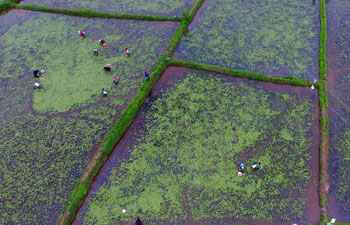UNITED NATIONS, May 10 (Xinhua) -- "Today is World Migratory Bird Day, which highlights the need for international cooperation to conserve these creatures and their habitats for the benefit of mankind, a UN spokesman said here Wednesday, spotlighting common destiny for wildlife and people in the globe.
According to the UN Environment Programme, millions of birds migrate every year along global flyways between continents, but many of them are facing steep declines in their population due to habitat loss caused by land-reclamation and changes in global agricultural practices as well as poaching, UN spokesman Stephane Dujarric said at a daily news briefing here.
The theme this year is "Their Future is Our Future -- A Healthy Planet for Migratory Birds and People," which is closely linked to the UN Sustainable Development Goals, a blueprint for the global development efforts for the years running up to 2030.
A healthy planet for migratory birds means a healthy planet for people, as they share the habitats on the Earth, the heads of two UN-backed environmental treaties said, marking World Migratory Bird Day.
"If we commit ourselves to sustainable development and preserve the habitats that we share with migratory birds, both wildlife and people will benefit, because their future is our future," said the executive secretary of the Convention on Migratory Species (CMS), Bradnee Chambers, in a press release.
Initiated in 2006, the World Day is celebrated each year to highlight the need for international cooperation to conserve migratory birds and their habitats for the benefit of mankind.
Migratory birds face an increasing number of threats while travelling huge distances. Their intercontinental flyways include key stopover sites that are essential for migratory birds to rest and refuel before continuing their journey. But land-reclamation and changes in global agricultural practices as well as poaching are causing habitat losses.
Habitat loss at stopover sites along the shores of the American Atlantic Coast have prompted a sharp 80 percent population decline in the North American breeding populations of the Red Knot since 2000.
In the African Sahel, migratory waterbirds, such as the Garganey Duck, are hunted to ensure food security for people in the region.
"Engaging local communities to practise sustainable hunting and in conserving waterbirds and their threatened wetland habitats is a core aspect of AEWA activities in Africa," said executive secretary of the African-Eurasian Migratory Waterbird Agreement (AEWA), Jacques Trouvilliez.

















